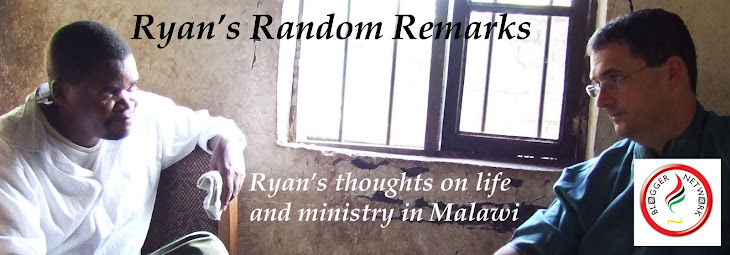
The local church building was not big enough to handle the meeting or to house so many people. So, the local primary school, which is on holiday now, became the venue. Just over 100 delegates and pastors from many of the AEC churches throughout Malawi came together to discuss issues related to the denomination. I attend this meeting every year as one of the missionaries that works with the AEC and as the head of the mission that started the AEC many years ago and continues to work closely with them.
Like most things in life attending the meeting has its positives and not so positives. I’ll start with the positives:
- Goat and rice or nsima (just found out the other day that goat is the most eaten meat in the world!)
- Fellowship with friends – mostly pastors and evangelists that I only see a couple of times a year.
- Being part of the life and development of the church
- Cultural insights gained from tea time conversations
- Learning more about how local context so affects the types of problems the church faces. There is constant struggle with basic issues like providing for the pastors and constructing basic church buildings.
- Being part of a community. There is a certain sense of togetherness, even in the disagreements, that I think sometimes is missing in our individual focused societies.
- To bed at 8:30
The not so positives:
- Goat and rice or nsima for all meals (except breakfast of course!)
- Camping on concrete floors
- Sitting on hard wood desks for 8 hours a day
- Pit toilets
- The balancing act required to successfully bathe from a bucket in a small wet space without getting your clothes, towel and other things completely soaked.
- Being asked, “When will you have funds to help buy roofing sheets for our church 10 or so times.”
- Getting up at 4:30

The meeting has a function of defining and working out issues for the denomination as a whole. Reports are also given. The head of the church, treasurer, church department heads and local leaders all give reports. This often takes a full day of the meetings. I also give a report. The reports have a role of informing the delegates of what is going on as well as giving an opportunity for delegates to make suggestions about problems identified in the reports. There are also questions that are asked. It is sometimes a public calling of leaders into account.
This year the main agenda of the meeting was to discuss the “Handbook of Rules.” This is a booklet that defines how the denomination functions and sets out guidelines for practice. I often chuckle at the name. Western society has so grated against rules and structures in recent years that I am sure the mentioning of a “Handbook of Rules” to many in western society churches would make the hair on their necks stand up. It doesn’t seem to be an issue for the church here. The Handbook is seen as defining the community. It gives guidelines for how the community should function as well as an identity - our ways of doing things identify us and differentiate us from other groups.
In the discussions, I was pleased to see one particular change. The Handbook had a general statement to say that Christians should not be involved in witchcraft or traditional practices. This will be expanded to specifically name some of the practices that are prevalent in society. It will probably be a long list as each tribe has their own practices, but I am happy to see the church take what will hopefully be a stronger stand on these issues.















